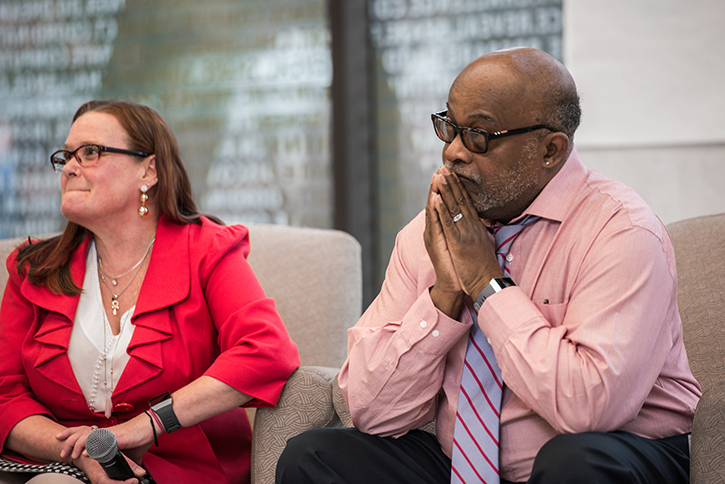
Angela Hattery and Earl Smith discuss their new book "Policing Black Bodies: How Black Lives are Surveilled" at a Black African Heritage Month event on Race and Policing in the U.S. at Mason. Photo by Evan Cantwell.
A new book by George Mason University faculty members Angela Hattery and Earl Smith, “Policing Black Bodies: How Black Lives Are Surveilled and How to Work for Change” (Rowman & Littlefield), has hit a nerve, and a raw one at that.
Since the book’s release earlier this year, Hattery, a professor the College of Humanities and Social Sciences and director of the Women and Gender Studies Program, and Smith, an adjunct professor in the Sociology and Anthropology Department, have been interviewed on numerous television and radio broadcasts and print publications, and for the most part, Smith said, the reception has been “thus far, pretty even.
“But the first thing that happens with a book titled this way—and we did it deliberately—is people are going to come out and say it’s an anti-police book,” he said. Comments such as those generally come from listeners to call-in shows, and generally from those who have not read the book.
“We’re heard from police officers who say [it’s not anti-police]. They say they read the book and there’s nothing in there that’s anti-police. The thing we’re calling for more than anything is some accountability.”
That would be accountability for the seemingly overwhelming number of police brutality cases transpiring around the country. “If you’ve been watching the news, it’s just incredible what’s going on,” Smith said. “You see police slamming people to the ground…I just watched them kill [on video] a young white male in a hotel lobby. There needs to accountability.”
And yet it seems to Smith that justice officials are doing anything but making police accountable.
“In every report we read about the protests around the country, they all said ‘police need de-escalation training.’ But the [U.S.] Supreme Court [in April] ruled that police can shoot first and ask questions later. You can’t make sense out of this stuff.”
The topical headlines never stop, Hattery said.
“It’s the summer of 2016, and we’re literally writing about the shooting of unarmed black men,” Hattery told the AFRO magazine. “And in that one week in July, Alton Sterling was murdered and Philando Castile was murdered. It was all inside of a week.”
That was among one of the challenges of writing the book, Hattery said.
“It’s a lot to hold. It was a very difficult book to write emotionally because it’s hard stuff,” she said.
One of the most difficult chapters to write, Smith said, was the one on exoneration.
“The pain of reading their stories and then interviewing some of the people who have been exonerated—people who had to sit in a prison cell for 15, 20, 30 years for a crime they didn’t commit, my gosh. And these folks are treated as criminals, and when they get out, they have to fight the state for compensation. For me, that was the most painful one.”
Angela Hattery is the Director of the Women and Gender Studies Program at George Mason University. She can be reached at ahattery@gmu.edu or 703-993-2897
Earl Smith is an adjunct faculty member in sociology at Mason and can be reached at esmith21@gmu.edu.
About George Mason
George Mason University is Virginia’s largest public research university. Located near Washington, D.C., Mason enrolls 36,000 students from 130 countries and all 50 states. Mason has grown rapidly over the past half-century and is recognized for its innovation and entrepreneurship, remarkable diversity and commitment to accessibility.
